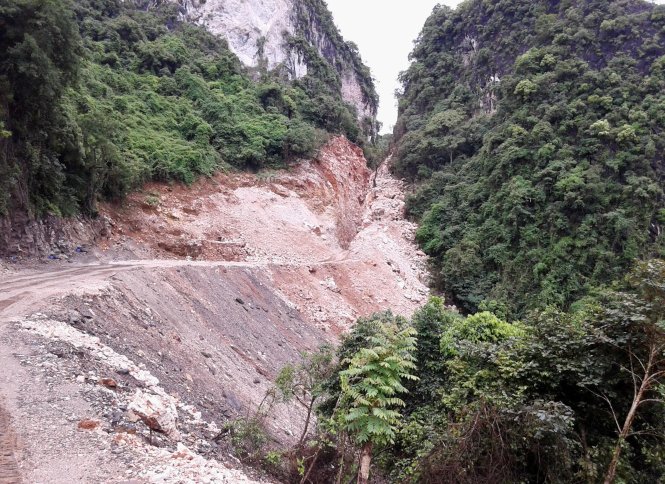Over the past year, a mountain in UNESCO-recognized Ha Long Bay’s peripheral area in northern Vietnam’s Quang Ninh Province has been blasted so a local company could build a road without a permit.
The 1-km road begins at the edge of a coastal limestone mountain in Ha Long City’s Ha Phong Ward and reaches the rim of Ha Long Bay.
The road, which measures three to five meters in width, eats into crevasses.
Several mountain sections were destroyed to make way for the road.
According to an investigation by Tuoi Tre, the road is part of the 30-hectare dumping ground which has been managed by Minh Anh Co. since 2008.
Over the past several days, the entrance to the road has been blocked by a barrier.
A group of young men is always on standby to stop anyone from entering the area.
In May, the provincial People’s Committee approved the company’s overall planning of the functioning structures.
The provincial authorities stressed that the company was not allowed to disrupt the area’s natural features and scenic beauty.
However, since last year, Minh Anh Co. has detonated parts of the mountain to build the road without permission.
Dao Van Thanh, the company’s CEO, explained that the road would ease travel to the beaches and hotels when their projects are complete.
He claimed that according to field observations and research, the road doesn’t belong to Ha Long Bay’s peripheral area.
Pham Hong Ha, chair of Ha Long City’s People’s Committee, told Tuoi Tre on Monday that Minh Anh Co. built the road while the province had yet to approve their detailed planning.
His committee has penalized the company for their violation, and demanded that all construction work on the road be ceased and damage to the mountain be repaired.
Pham Thuy Duong, head of the bay’s management, pointed out that the World Heritage Site’s core areas are strictly protected from any human impact or interference.
Meanwhile, projects launched in the peripheral areas must have assessment reports on environmental impact.
She asserted that the road connecting Minh Anh Co.’s dumping ground to Ha Long Bay does belong to the heritage site’s peripheral areas.
Duong added that as the site’s management has yet to access the company’s project, they still can’t assess the extent of the damage to the site’s environment and landscape.
Ha Long Bay has won a slew of awards and honors over the years, including the World Heritage Site title given by UNESCO in 1994 and 2000.






















































